| De La Salle Life |
| De La Salle Life |
THE FOUNDER
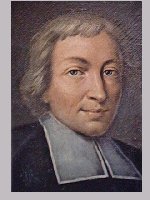 |
There was nothing in De La Salle's background to prepare him for the educational adventure he was destined to undertake. He was born in Reims in 1651, the eldest of eleven children, seven of whom survived beyond infancy. The family belonged to the upper bourgeoisie, not noble, but distinguished and comfortably well-to-do. The father, Louis de La Salle, was a magistrate of the presidial court at Reims; the mother, Nicolle Moet, came from the very same family that still today produces such fine champagne. The children were raised in an atmosphere of piety and culture in a well-appointed ancestral home that survives to this day. Excursions into the surrounding countryside of the Champagne region were frequent, as were soirees and entertainments in the house in town. |
The father is known to have been a true humanist with an appreciation of good music, conversation and books. And the mother was more than ordinarily devout.
John Baptist himself was a pious lad who took the first tentative step toward the priesthood by receiving the clerical tonsure when he was only eleven. At the age of fifteen, he was made a canon of the Reims cathedral. That required his regular attendance at the daily office and the more solemn functions in the cathedral. In return, the teen-age cleric received a stipend that in today's money would amount to about $10,000 a year. When John Baptist was twenty-one years old, his parents died within months of each other, leaving him with the care of his younger brothers and sisters. He was able, however, to continue his theological studies and in 1678 he was ordained a priest.
If there was nothing in the family background to prepare De La Salle for an adventure in the field of education, the same is even more true of the education that he himself received. The course of studies and the teaching methods had little changed since the Middle Ages. The curriculum was designed to educate the elite few who were destined for the university studies required for careers in medicine, law or the Church. The vehicle of instruction was Latin with the classical authors as the basis for the courses in grammar and rhetoric. The study of rhetoric was followed by two years of philosophy derived from Aristotle and Thomas Aquinas. There were no courses in history or the rich contemporary literature of seventeenth century France. The philosophy of Descartes was explicitly proscribed as downright dangerous. At the conclusion of the philosophy course, the successful students received what then passed as a master of arts degree. John Baptist was awarded his, summa cum laude, at the age of eighteen.
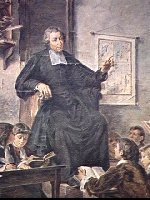
De La Salle began his university studies in theology at Paris, but the untimely death of his parents brought him back to Reims. He enrolled in the university there and followed the program required to this day of candidates for the priesthood. There were the usual courses in advanced philosophy, fundamental theology, patristics and moral theology, as well as the dogmatic tracts on the Trinity and Incarnation, Grace and the Sacraments. We know the names of the teachers that De La Salle had both in Reims and in Paris; documents survive attesting to his scholarship; there is even a set of course notes taken down by one of his classmates. The knowledge of the students was tested by a series of oral examinations ‹ proof against cheating ‹ scholastic disputations, written essays and the public defense of a thesis. De La Salle received the S.T.L. degree, the licentiate in theology, in 1678, the same year that he was ordained. He was invested in the scarlet robes of a doctor of theology in 1680. That is something else worth celebrating after three hundred years, at least by those of us who hold the same degree.
After such a long and tiresome course of study, thoroughly classical and clerical, De La Salle was probably ready for some kind of an adventure. In fact, by the time he had completed his own formal education and donned the doctor's hood, that adventure had already begun. It was destined to lead him into a social and educational milieu that was the very antithesis of everything he had experienced up to that time, both at home and in school.
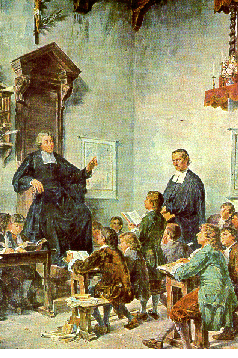
His venture into the educational field began not with boys but with girls, with a community, not of Brothers but of Sisters. Only a week or two after his ordination in 1678, De La Salle's close friend and advisor, Father Nicolas Roland, died. In his will he left to the care of his friend a small teaching community known as the Sisters of the Infant Jesus. They were in the process of trying to obtain ecclesiastical and civil approval; in this they were ultimately successful, thanks to the guidance and influence of John Baptist de La Salle. To this day, the sisters in Reims look to him as their second founder, after Nicolas Roland.
One day in 1679, as De La Salle was going to meet the Mother Superior of this community, he happened to encounter at the convent door an enthusiastic and zealous layman named Adrien Nyel. Nyel had just arrived from Rouen with a fourteen year old assistant and letters of introduction to the Sisters. He was interested in opening a school for poor boys in Reims as an extension of work he had already begun in Rouen. De La Salle agreed to do what he could to help. He brought Nyel to his home where he then assembled some influential clerical friends to win their support for Nyel. It was necessary to proceed cautiously, since the city authorities were reluctant to allow new charitable enterprises that would put undue strain on the municipal resources. After some discussion, it was agreed that the pastor of the church of St. Maurice, Father Dorigny, a cousin of De La Salle, would provide room and board for Nyel and his young assistant. It was there in 1679, sometime in April, that the first school for poor boys in Reims was opened. The adventure had indeed begun.
But De La Salle did not know that it had begun, much less did he suspect where it would lead. Once the school was opened, he no doubt thought that his part in the affair was concluded. He merely kept himself available in case Nyel should need further help. The call came very quickly. There was a rich and dying widow in the parish of St. Jacques who wanted to provide for a charitable school in her neighborhood. Mistrusting the enthusiasm of Nyel, she insisted on dealing with De La Salle in making the arrangements. It soon became apparent that Nyel was better at starting new enterprises than he was in dealing with the teachers he recruited for the two schools. More and more, De La Salle was called upon to help in keeping them organized.
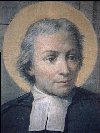 |
It should be kept in mind that in those days no special training or commitment was required to teach in the poor schools. The pay was poor and any semiliterate person was considered equal to the task which was classified as unskilled labor. De La Salle began to realize that if the schools were to produce any significant results for the poor lads who came to them, more was needed. Before the year 1679 was out, he had rented a house for the teachers next to his own and so became ever more deeply involved in their formation. |
Requests were soon pouring in to open new schools, not only in Reims but in the surrounding towns of Champagne. Nyel was often on the road and engaged in these negotiations, leaving the teachers in the care of De La Salle. Eventually Nyel withdrew from the Reims adventure altogether and returned to Rouen where he died shortly thereafter. Meanwhile, it became increasingly evident to De La Salle that he had gotten himself involved in a project worthy of all his time and talents. When the lease on the house next door expired, he moved the rough and uncouth teachers into his own home, much to the shock and dismay of his more respectable relatives. Most of his own brothers and sisters had already left home or did so shortly thereafter. In 1682, he sold the family house and moved with the teachers into a house he rented midway between the two schools. Within a short time all the teachers recruited by Nyel abandoned the project. They were unwilling to share the meager financial rewards of their work and even more reluctant to submit to the intellectual and religious discipline demanded of the by De La Salle. His effort to transform what had been considered a menial job into a vocation worth of total commitment was more successful when new recruits soon came to take the place of those who had left. Thus was formed on the Rue Neuve in Reims the first community to call themselves Brothers, dedicated to the apostolate of the Christian Schools and totally under the direction of John Baptist de La Salle.
Events moved swiftly from then on. There was still enough uncertainty in the adventure for the Brothers to take with a grain of salt the Founder's injunction to trust to God's Providence for the successful outcome of their work. After all, they reminded him, he was a priest and a canon of the Cathedral as well, with a steady source of income and a wealthy inheritance to fall back on. De La Salle admitted that they had a point. After seeking advice and after much opposition from his archbishop, De La Salle resigned his lucrative post as canon in favor of a poor priest. In the following winter, when Reims was suffering from a terrible famine, he liquidated his entire personal fortune and gave the proceeds to help feed the poor of the town. From here on, there was no turning back.
The young society, despite ups and downs, misunderstandings and outright persecution, grew and solidified. Startled by the death of a Brother he had earmarked for the priesthood in the hope of providing for a successor, De La Salle became convinced that his society should be composed exclusively of laymen, committed to the apostolate of the gratuitous schools. The strange habit that the Brothers wore in those days ‹ calf-length robe, a long cape with hanging sleeves, a broad-brimmed hat and heavy boots ‹ set the Brothers apart both from the clergy and from secular laymen. The sense of association was very strong and so was the devotion and fidelity of the Brothers to their Founder and his vision. There were some experiments with various forms of schools: teacher training centers, especially to train rural schoolmasters, one or two boarding schools, a school for prisoners, and even a Sunday academy for those who wanted to cultivate the graceful arts. But for the most part, the Brothers taught in elementary schools in the poorer parishes, and always gratuitously. The instruction was given in French rather than Latin; the simultaneous method of teaching, not universally in vogue at that time, was employed to achieve the most practical results; the emphasis was very much on the basics, the skills that would be useful in helping the students from poor families to earn a living and improve their social and financial condition. The work spread from Reims to Paris, then to Provence and the cities in the South, to Rouen and the cities in the North. By the time of the Founder's death in 1719, there were Christian Schools, as he called them, all over France.
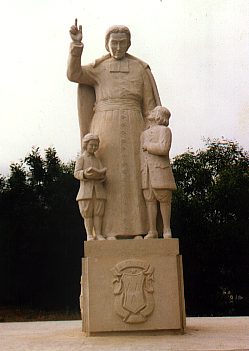
In what sense can this beginning be called an adventure? Sometimes the impression is given that De La Salle was an educational innovator, a creative genius who burst on the educational scene without preparation or precedent. That is not quite the truth. Eighty years before De La Salle, Pierre Fournier had founded a congregation of religious Sisters devoted to the education of poor girls. The Sisters employed in their schools many of the same policies and methods, including simultaneous instruction, that De La Salle was to adopt later on. There was an anonymous work published in Paris in 1654 called L'Escole Paroissale which provided some fresh ideas on how a parish school ought to be conducted. In 1666, Charles Demia, the founder of the Sister of St. Charles, addressed his famous manifesto to the influential citizens of Lyons, demanding that something be done for the education of the poor in order to eliminate the social and political evils that were rooted in poverty and ignorance. Long before he met De La Salle, Adrien Nyel was part of a movement, already underway in Rouen under the direction of Father Nicolas Barre, to provide a suitable education for the children of artisans and the poor.
What was distinctive about the Lasallian contribution was the lasting impact that it had on popular education. One explanation for this may lie in the hidden designs of divine providence. But it also affords a rather good illustration of the relationship that classical sociologists postulate between charism and institution. Unlike many of his predecessors, De La Salle was the sort of charismatic leader who attracted to himself and his work a close knit and loyal band of dedicated disciples. It was De La Salle with his Brothers, then, that gave the charism, the vision, the adventure if you will, an institutional form. It is that Institute, the Institute of the Brothers of the Christian Schools, that has borne that charism, kept the adventure alive, and made it available to all the succeeding generations for the last three hundred years. It is time then, to shift the focus from De La Salle to his Institute.
![]()